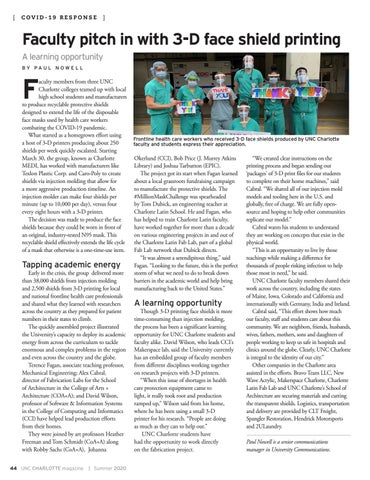[
C OV I D - 1 9 R E S P O N S E
]
Faculty pitch in with 3-D face shield printing A learning opportunity BY PAU L N OW E L L
F
aculty members from three UNC Charlotte colleges teamed up with local high school students and manufacturers to produce recyclable protective shields designed to extend the life of the disposable face masks used by health care workers combating the COVID-19 pandemic. What started as a homegrown effort using a host of 3-D printers producing about 250 shields per week quickly escalated. Starting March 30, the group, known as Charlotte MEDI, has worked with manufacturers like Texlon Plastic Corp. and Caro-Poly to create shields via injection molding that allow for a more aggressive production timeline. An injection molder can make four shields per minute (up to 10,000 per day), versus four every eight hours with a 3-D printer. The decision was made to produce the face shields because they could be worn in front of an original, industry-tested N95 mask. This recyclable shield effectively extends the life cycle of a mask that otherwise is a one-time-use item.
Tapping academic energy
Early in the crisis, the group delivered more than 38,000 shields from injection molding and 2,500 shields from 3-D printing for local and national frontline health care professionals and shared what they learned with researchers across the country as they prepared for patient numbers in their states to climb. The quickly assembled project illustrated the University’s capacity to deploy its academic energy from across the curriculum to tackle enormous and complex problems in the region and even across the country and the globe. Terence Fagan, associate teaching professor, Mechanical Engineering; Alex Cabral, director of Fabrication Labs for the School of Architecture in the College of Arts + Architecture (COA+A); and David Wilson, professor of Software & Information Systems in the College of Computing and Informatics (CCI) have helped lead production efforts from their homes. They were joined by art professors Heather Freeman and Tom Schmidt (CoA+A) along with Robby Sachs (CoA+A), Johanna 44 UNC CHARLOTTE magazine
| Summer 2020
Frontline health care workers who received 3-D face shields produced by UNC Charlotte faculty and students express their appreciation.
Okerlund (CCI), Bob Price (J. Murrey Atkins Library) and Joshua Tarbutton (EPIC). The project got its start when Fagan learned about a local grassroots fundraising campaign to manufacture the protective shields. The #MillionMaskChallenge was spearheaded by Tom Dubick, an engineering teacher at Charlotte Latin School. He and Fagan, who has helped to train Charlotte Latin faculty, have worked together for more than a decade on various engineering projects in and out of the Charlotte Latin Fab Lab, part of a global Fab Lab network that Dubick directs. “It was almost a serendipitous thing,” said Fagan. “Looking to the future, this is the perfect storm of what we need to do to break down barriers in the academic world and help bring manufacturing back to the United States.”
A learning opportunity
Though 3-D printing face shields is more time-consuming than injection molding, the process has been a significant learning opportunity for UNC Charlotte students and faculty alike. David Wilson, who leads CCI’s Makerspace lab, said the University currently has an embedded group of faculty members from different disciplines working together on research projects with 3-D printers. “When this issue of shortages in health care protection equipment came to light, it really took root and production ramped up,” Wilson said from his home, where he has been using a small 3-D printer for his research. “People are doing as much as they can to help out.” UNC Charlotte students have had the opportunity to work directly on the fabrication project.
“We created clear instructions on the printing process and began sending out ‘packages’ of 3-D print files for our students to complete on their home machines,” said Cabral. “We shared all of our injection mold models and tooling here in the U.S. and globally, free of charge. We are fully opensource and hoping to help other communities replicate our model.” Cabral wants his students to understand they are working on concepts that exist in the physical world. “This is an opportunity to live by those teachings while making a difference for thousands of people risking infection to help those most in need,” he said. UNC Charlotte faculty members shared their work across the country, including the states of Maine, Iowa, Colorado and California and internationally with Germany, India and Ireland. Cabral said, “This effort shows how much our faculty, staff and students care about this community. We are neighbors, friends, husbands, wives, fathers, mothers, sons and daughters of people working to keep us safe in hospitals and clinics around the globe. Clearly, UNC Charlotte is integral to the identity of our city.” Other companies in the Charlotte area assisted in the efforts. Bravo Team LLC, New Wave Acrylic, Makerspace Charlotte, Charlotte Latin Fab Lab and UNC Charlotte’s School of Architecture are securing materials and cutting the transparent shields. Logistics, transportation and delivery are provided by CLT Freight, Spangler Restoration, Hendrick Motorsports and 2ULaundry. Paul Nowell is a senior communications manager in University Communications.








